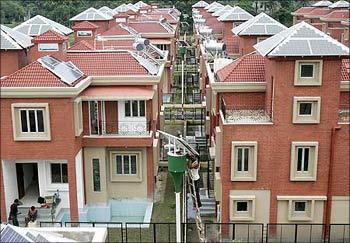 The Reserve Bank of India has sounded a note of caution on bank exposure to builders and developers. The move comes at a time when activity in the real estate space is picking up with builders launching new projects.
The Reserve Bank of India has sounded a note of caution on bank exposure to builders and developers. The move comes at a time when activity in the real estate space is picking up with builders launching new projects.
In a circular issued this evening, the regulator has asked banks to assess financial viability of a group with interests in the real estate space and not just on a company given the presence of subsidiaries, related parties and special purpose vehicles through which they operate.
"It has been observed that some of the companies operating in the real estate sector have significant exposure in the form of advances, investments, etc to their subsidiaries and other group or related entities. As a matter of prudence, banks may meticulously assess the inherent group risk of their borrowal accounts falling under the purview of the real estate sector," the RBI circular said.
"The directive makes sense since there could be a situation where the risk emerging from the performance of a subsidiary can affect the repayment capability of the parent company to which banks have a direct exposure," said the credit monitoring head of a large public sector bank.
Developers were, however, not pleased with the move and said it would be a time consuming and voluminous task if they had to furnish details of all subsidiaries.
"Normally, real estate companies have hundreds of subsidiaries and, if one has to submit details of all of them, it would be time consuming. We have to see whether banks have to check the details of projects they are funding or all the projects and see what is the extent of disclosure they seek,'' said Sunil Malhotra, vice-president (finance) of Omaxe, a Delhi-based developer.
Consultants said the RBI move would bring in more transparency in the real estate sector where developers float a number of units to buy land, develop projects and raise funds.
"Buying and selling of land requires a lot of transaction cost and, hence, developers buy land through different SPVs. In some cases, SPVs could have high leveraged positions. SPVs also seek guarantees, mortgage from parent. So all of them need to be examined in totality,'' said Ambar Maheshwari, director, investments at DTZ, an international property consultant.
"As far as implications go, I am not sure whether it will have anything negative or positive. Banks normally check financials if a subsidiary is 100 per cent owned by the parent. But now banks have a guideline to look at,'' Maheshwari said.
Real estate was one of the worst affected sectors during the economic downturn in India. Following the credit crisis last year, some banks had to restructure their exposure to some of the country's leading real estate players.
In addition, fresh credit lines were approved to help the developers tide over the liquidity crunch. On their part, real estate developers which had diversified into hotels, financial sector and the retail space have sought to dispose non-core assets to get back into shape. In their core business of real estate, they have lowered the rates and are now focusing on affordable housing projects.
While overall credit flow has slowed down, the banking sector's outstanding exposure to the real estate sector was Rs 94,499 crore (Rs 944.99 billion) at the end of May. On a year-on-year basis, funding to this sector went up by 52 per cent.
RBI treats loans to real estate entities as exposure to the sensitive sector. It has maintained a close watch all along on the credit flow to this sector.
In the past, it has increased risk weights and standard provisioning for loans to real estate sector to prevent building of asset bubbles, hinting banks to go slow on lending to this segment. This was done when land prices began to move at a fast clip during 2004-06.
Soon after the collapse of Lehman Brothers in September 2008, realty prices slumped.






